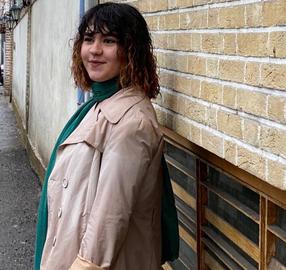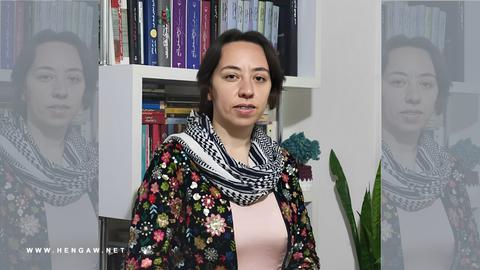Saeedeh Qods is the founder of Mahak, a charitable foundation dedicated to helping youngsters suffering from cancer, one of the biggest of its kind that put her name on the Wall Street Journal’s 2008 list of Women to Watch. Within less than 15 years of its launch Mahak became one of the most powerful charities and has helped numerous families. It also runs the Mahak Hospital and Rehabilitation Complex, the biggest and best-equipped paediatric cancer hospital in Iran and the Middle East.
Born in Golab Dareh, Tehran, in 1951, Qods was the eldest of five children: four girls and one boy. Her father was a school principal and died when she was just 19 years old. Following the tragedy it was the young Saeedeh who took care of her family together with her mother. She later studied geography at university and after graduating became an expert on budget and planning at the Iranian Tobacco Company, and later worked in international relations at Iran’s Ministry of Industry.
Qods was 23 when she met her husband Nader Sharifi, who worked at the Ministry of Foreign Affairs. After their marriage they traveled to Pakistan and then moved to Germany, where she began studying sociology. Their son Mahyad was born in 1978. On her return to Iran in 1981 Qods began to work again. But after her daughter Kiana was born in 1985 she resigned and devoted her life to bringing up her children.
The Turning Point
Kiana was two years old when, in the course of a routine medical examination, the paediatrician discovered a tumour in her kidney. Her daughter’s fraught and painful road to recovery would prove to be a turning point in Qods’ life.
Kiana’s treatment began in Iran. According to Qods, because the disease was advanced the family could not afford to wait for travel documents to seek medical help overseas. Kiana’s stay in an Iranian children’s hospital led Qods to get to know the suffering of other children with cancer and their families, many of whom - those who could not afford the medical expenses - were left out in the cold by the hospital. She heard the sobs of sick youngsters in need of treatment and witnessed the tears of their desperate parents.
Qods began to contemplate ways to change this. “At the beginning I tried to help in any way I could: I’d give them money or anything else they needed,” she recalls. “Many families came from other towns to hospitalise their child, without anywhere to stay, so I found them a place... until Kiana’s chemotherapy was over and we took her abroad for a checkup.”
In Germany Qods learned something that sparked the idea of founding the Mahak Institute: there the treatment of children with cancer was almost completely free, paid for by numerous social institutions. And there were special hospitals which provided such services to these children. They had playrooms and social workers who could support the children’s mental wellbeing.
Qods also realised that the parents of these children were supported throughout the process, especially those who had become very vulnerable themselves as a result of their child’s condition. She became acquainted with the House of Mothers Association, where the families of children with cancer could learn how to cope with problems they faced.
In 1989 Qods returned to Iran with a healthy daughter and a different outlook. Around the time the doctors told her that Kiana’s cancer had been eradicated and was in remission she had made up her mind to create a charity to support children with cancer.
Qods spoke to Kiana’s doctors and those she knew had the financial resources. She began the preliminary preparations for registering the first Centre to Support Children with Cancer. The centre took shape with the support of 20 families, working together under the name Mahak.
Realising the Idea
The group first met at the homes of people who had announced their readiness to help, but finally, in 2000, Mahak was born in one of the doctors’ rooms at Tehran Clinic Hospital. Its logo included a leaf, symbolising life, and the silhouette of a family. Qods was elected as CEO and worked hard to publicise Mahak’s work and attract donations.
Mahak’s early fundraising activities included concerts, exhibitions, the distribution of money boxes and membership sign-ups. The membership fee was initially just 200 tomans a month. Nevertheless it proved a struggle to recruit people as many were not familiar with the complexities of childhood cancer. As a result, informing society about this disease and its social and individual consequences became one of Mahak’s top priorities.
The first of Mahak’s charity markets was held at Eskan Towers, a large commercial and business high-rise complex in Tehran, with the help of one of its members who lived there. At the second of these events, Qods recalls, Mahak raised 30 million tomans. These markets also brought in hundreds of new members and supporters for Mahak.
Qods and her companions at Mahak were well aware of the needs of families of children with cancer. The most important were the provision of medicine, having a place to live, being treated with respect by medical staff and having enough information about the disease and the side-effects of treatment.
Mahak also positioned itself as a centre for social workers who worked for state university hospitals. Finding affected families a place to live was one of Mahak’s most important concerns and eventually, through the efforts and persistence of its members, this need was finally and permanently fulfilled. After repeated meetings with the group, Tehran Municipality agreed to provide a four-storey building on Tehran’s Vila Street to accommodate the families of children receiving treatment.
Qods later bought a 4,400 sq. m. plot of land in Dar Abad, northeastern Tehran, from the income generated by the charity markets. The initial idea was to build accommodations for the children’s families, but with the help of Dr. Javad Karbasizadeh whose wife Afsaneh Dabiri had dreamed of a hospital for cancer patients before she died, Mahak was able to realise a much more ambitious plan: an 18,000 sq. m., 120-bed specialised hospital, which opened in 2009 and soon became the region’s premier centre for the treatment of under-16s with cancer. Most importantly, if a child came from a low-income family, the services provided by the Mahak Hospital and Rehabilitation Complex were free of charge.
Dreams for the Future
To date the institution has treated tens of thousands of children with cancer and supported their families, saving the lives of many children.
Qods herself has also gone on to write a best-selling book and has won dozens of awards for her own efforts and those of the charity that she founded. In 2008 Qods was ranked 45th on the Wall Street Journal’s list of Women to Watch. But nothing makes her as happy as seeing a child become cancer-free under the care of her institution, even though she says that she has a few other wishes.
Her best-selling book, a historical novel, has been reprinted more than 50 times since it was first published in 2004, and she wishes to write a second book, which she has not yet completed due to her time-consuming work at Mahak. Another of Qods’ dreams is to build a special hospital for breast cancer patients. A third is to launch a new initiative to educate people about the plastic waste that destroys the environment.
visit the accountability section
In this section of Iran Wire, you can contact the officials and launch your campaign for various problems

























comments